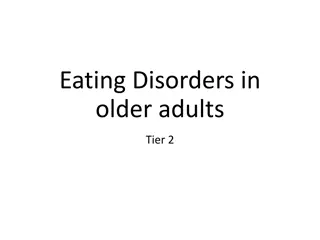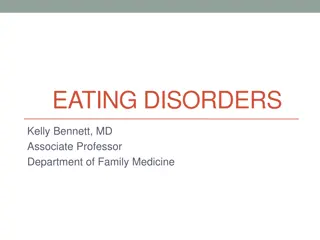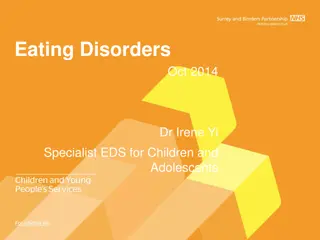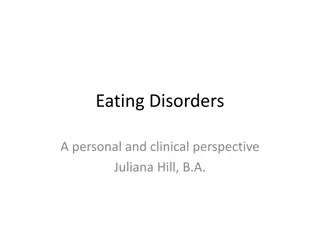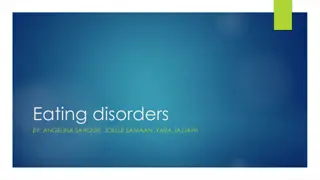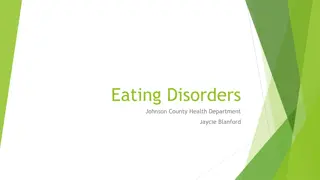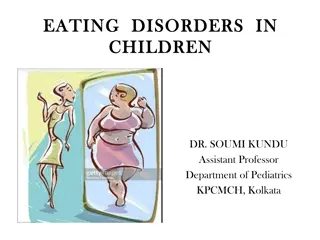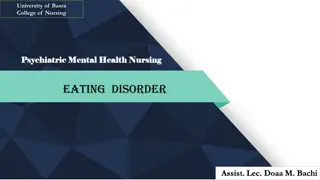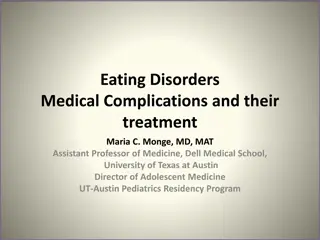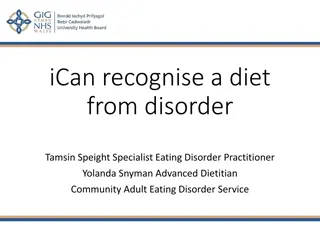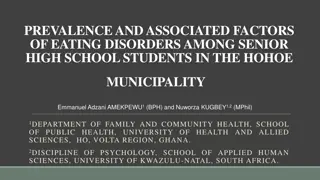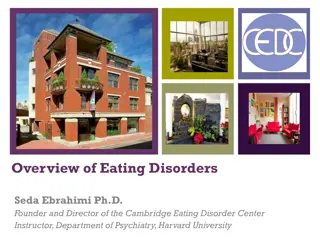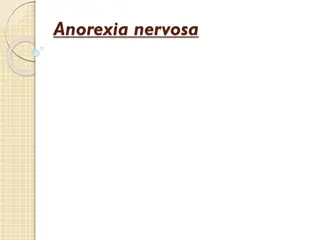Understanding Eating Disorders in Older Adults
Eating disorders can affect older adults too, yet they are often overlooked or misdiagnosed. Challenges in diagnosing these disorders arise from various underlying health conditions. Types of eating disorders include anorexia nervosa, bulimia nervosa, binge eating disorder, and others. Recognizing c
0 views • 7 slides
Understanding Eating Disorders: Diagnostic Criteria, Signs, and Treatments
This presentation covers the diagnostic criteria, signs, and treatments for anorexia nervosa, bulimia nervosa, and binge-eating disorder. It details the subtypes, severity levels, prevalence, development, courses, and risk factors associated with eating disorders, providing a comprehensive overview
0 views • 32 slides
Healthy Living Tips and Information on Eating Disorders
Various images and descriptions cover a range of topics including healthy food choices, the importance of carbohydrates, engaging in sports activities like swimming and football, and the risks and characteristics of eating disorders such as anorexia and bulimia. Links to relevant YouTube videos are
0 views • 7 slides
Understanding Eating Disorders: Types, Signs, Effects, and Recovery
Eating disorders are mental disorders characterized by unhealthy eating habits and can have severe physical and psychological consequences. This article explores the definition of eating disorders, signs to look out for, different types such as Anorexia Nervosa, Bulimia Nervosa, Pica, and Purging Di
0 views • 10 slides
Understanding Eating Disorders in Children and Adolescents: Insights from Dr. Irene Yi
This comprehensive presentation by Dr. Irene Yi delves into eating disorders, including Anorexia Nervosa and Bulimia, in children and adolescents. The content covers types of eating disorders, developmental perspectives, assessment stages, and management strategies. NICE guidelines for managing eati
0 views • 25 slides
Understanding Eating Disorders: A Personal and Clinical Perspective
This insightful content delves into eating disorders from a personal narrative and clinical standpoint, covering Anorexia Nervosa, Bulimia Nervosa, and Eating Disorder Not Otherwise Specified (EDNOS). It provides criteria for each disorder, facts, and statistics, shedding light on the challenges, im
1 views • 15 slides
Understanding Eating Disorders: Types, Signs, and Recovery
Eating disorders are mental disorders characterized by unusual eating habits that can negatively impact physical and mental health. They manifest in various forms such as anorexia nervosa, bulimia nervosa, pica, and purging disorder. Recognizing signs like changes in weight, body image obsession, an
0 views • 6 slides
Understanding Eating Disorders: Insights and Treatments
Body dissatisfaction is prevalent in both men and women, leading to the development of eating disorders like anorexia nervosa and bulimia nervosa. Anorexia nervosa is characterized by restricted food intake and intense fear of weight gain, while bulimia nervosa involves binge eating and purging beha
0 views • 13 slides
Understanding Eating Disorders in Children by Dr. Soumi Kundu
Eating disorders in children, such as anorexia nervosa, bulimia nervosa, and binge eating disorder, are complex biopsychosocial disorders characterized by dysfunctional patterns of cognition and weight control behaviors. They result in significant physical, psychological, and social complications. T
0 views • 34 slides
Understanding Eating Disorders: An Overview from University of Basra College of Nursing
Eating disorders have a long history, with anorexia nervosa established as a mental disorder in the 1960s and bulimia nervosa described later. These disorders can be viewed on a continuum, with anorexia, bulimia, and obesity at different ends. Anorexia nervosa is characterized by restrictive behavio
0 views • 30 slides
Understanding Eating Disorders: Medical Complications and Treatment
This presentation by Dr. Maria C. Monge covers the common eating disorders in teenage patients, potential medical complications, and the role of the medical team in treatment. It includes definitions of disorders like Anorexia Nervosa, Bulimia Nervosa, and Binge Eating Disorder according to DSM-5 cr
0 views • 60 slides
Understanding Eating Disorders: Types, Signs, and Support
Eating disorders encompass unhealthy attitudes towards food and body image, affecting individuals' physical and mental well-being. Types such as anorexia nervosa, bulimia, binge eating disorder, and OSFED are discussed, along with the emotional aspects of these conditions. Recognizing signs, seeking
0 views • 45 slides
Prevalence and Factors of Eating Disorders Among High School Students
Eating disorders pose serious risks to individuals, influenced by various factors such as genetics, trauma, and sociocultural ideals. The disorders, including anorexia nervosa and bulimia nervosa, have high mortality rates and often coexist with other mental conditions. Recognizing signs like body i
1 views • 28 slides
Understanding Eating Disorders: Overview, Prevalence, and Types
This detailed information covers the prevalence of eating disorders in the U.S., including statistics on anorexia, bulimia, and binge eating disorder. It also delves into the impact of eating disorders on children and adolescents, highlighting disturbing trends in body image and obesity rates. Addit
0 views • 30 slides
Understanding Anorexia Nervosa, Bulimia Nervosa, and Post-Partum Psychiatric Disorders
Anorexia nervosa is characterized by significant weight loss, fear of gaining weight, and disturbed body image. It predominantly affects women in adolescence, often associated with dieting and harmful behaviors. Diagnosis involves criteria such as weight loss and amenorrhea. Complications include em
0 views • 14 slides
Eating Disorders Treatment in the UK
Eating disorders encompass a range of conditions characterized by unhealthy eating habits and preoccupation with food, body weight, and shape. Common types include anorexia nervosa, bulimia nervosa, and binge eating disorder. These conditions often a
2 views • 6 slides
